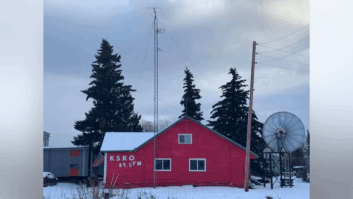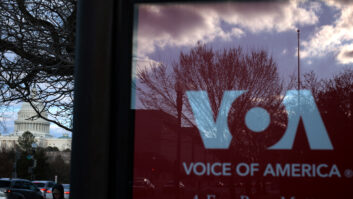President Trump has ordered the federal government to stop funding National Public Radio and the Public Broadcasting Service, setting up a potentially historic test of presidential authority.
The Corporation for Public Broadcasting, which disburses funds to NPR and PBS at the direction of Congress, immediately responded by saying that it is not a federal executive agency subject to the president’s authority.
NPR said, “We will challenge this executive order using all means available.”
Trump used the executive order on Thursday seeking to accomplish what critics of public media funding have been unable to do through action in Congress.
The order was titled “Ending Taxpayer Subsidization of Biased Media.”
“Unlike in 1967, when the CPB was established, today the media landscape is filled with abundant, diverse and innovative news options,” the order reads.
“Government funding of news media in this environment is not only outdated and unnecessary but corrosive to the appearance of journalistic independence.
“At the very least, Americans have the right to expect that if their tax dollars fund public broadcasting at all, they fund only fair, accurate, unbiased and nonpartisan news coverage. No media outlet has a constitutional right to taxpayer subsidies, and the government is entitled to determine which categories of activities to subsidize.”
Trump said that in subsidizing NPR and PBS, the CPB fails to abide by restrictions that it not contribute to or otherwise support any political party.
“Which viewpoints NPR and PBS promote does not matter,” Trump wrote. “What does matter is that neither entity presents a fair, accurate or unbiased portrayal of current events to taxpaying citizens.”
But critics of the administration say Trump has sought to quash media voices selectively and use the power of his office to strike at his critics as well as a free press. One month earlier Trump posted on the Truth social site, in all caps, “Republicans must defund and totally disassociate themselves from NPR & PBS, the radical left ‘monsters’ that so badly hurt our country!”
According to news coverage by the BBC, more than 40 million Americans listen to NPR public radio each week, and 36 million watch a local television station from the PBS network each month, according to their estimates.
NPR issued a statement Friday (read it here). “With the creation of the Public Broadcasting Act, Congress explicitly forbade ‘any department, agency, officer or employee of the United States to exercise any direction, supervision or control over educational television or radio broadcasting.’ This independence has informed the role of public broadcasting in the American interest for more than half a century, and is core to our relentless commitment to editorial independence and integrity in our service today,” it wrote.
NPR called the order “an affront to the First Amendment rights of NPR and locally owned and operated stations throughout America to produce and air programming that meets the needs of their communities. It is also an affront to the First Amendment rights of station listeners and donors who support independent news and information.”
[Related: “Trump Actions ‘Could Collapse Our Nation’s Public Media System’”]
Federal funding is about 1 percent of NPR’s own budget, but public media supporters have said that a loss of funding could hurt stations badly, especially small and rural stations, and undercut the local newsrooms that provide content to the network.
Anticipating the executive order, NPR CEO Katherine Maher said in an interview last month, “The biggest effect would be on the NPR network, which are the 246 stations around the country that [our audience is] probably listening to us on, right now. Those are our member stations, and they receive about $100 million of the $121 [to] $122 million that goes to public radio every single year. So the big impact would be on rural stations, stations in geographies that are quite large or complex in order to be able to receive broadcast or infrastructure, costs are very high. You could see some of those stations really having to cut back services or potentially going away altogether.”
NPR has reported that combined federal funds for public media in fiscal 2026 and 2027 would total $1.1 billion, of which public radio would receive $250 million.
The organization America’s Public Television Stations issued a statement lamenting the order. “Public media has earned the broad support of the American people, across the political spectrum, including 65% of people who voted for President Trump who think public television is either adequately funded or underfunded, according to a recent YouGov survey,” it wrote. “And just last month, the Pew Research Center found that Americans are more likely to support than oppose continuing federal funding for NPR and PBS by a factor of almost 2:1.”
At a congressional hearing in March, Ed Ullman, president and CEO of Alaska Public Media defended public broadcasting’s importance, especially in rural areas.
“In many parts of Alaska and communities throughout the country, public media is often the only locally operated, locally controlled broadcasting service. We are more than ‘nice to have.’ We are essential, especially in remote and rural places where commercial broadcasting cannot succeed.”
Earlier this week, the CPB filed a lawsuit to stop the Trump administration from firing three of its board members, claiming the president has no power to do so.
FCC Chairman Brendan Carr supports the moves to defund public broadcasting and has ordered an investigation into how sponsorships are handled.
“For my own part, I do not see a reason why Congress should continue sending taxpayer dollars to NPR and PBS given the changes in the media marketplace since the passage of the Public Broadcasting Act of 1967,” the chairman said when issuing the order at the end of January.
TV Tech Editor in Chief Tom Butts contributed to this story.





